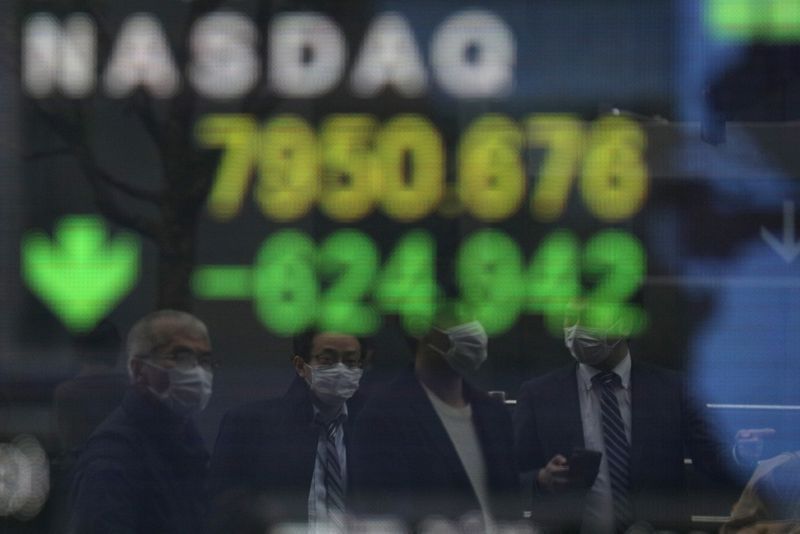This post was originally published on this site
https://i-invdn-com.akamaized.net/trkd-images/LYNXMPEG2B003_L.jpg © Reuters. FILE PHOTO: People wearing protective face masks are reflected in a stock quotation board outside a brokerage in Tokyo
© Reuters. FILE PHOTO: People wearing protective face masks are reflected in a stock quotation board outside a brokerage in TokyoBy Hideyuki Sano
TOKYO (Reuters) – Global shares were set for a rocky ride on Thursday as investors tally the economic damage of coronavirus, a day after the U.S. Dow Jones industrials entered bear market territory and world health officials declared the virus a pandemic.
Markets desperate for government action to offset the impacts of the global outbreak will look to an address by U.S. President Donald Trump scheduled for 9 p.m. EDT (0100 GMT).
“Markets are crying out for a co-ordinated response to COVID-19 headwinds and a lack of concrete U.S. policy action is rattling markets,” Tapas Strickland, director of economics at National Australia Bank in Sydney said in a report.
MSCI’s broadest index of Asia-Pacific shares outside Japan () dropped 0.27% in early trade while Nikkei futures suggest a 0.5% fall in Japanese shares (). Australia’s benchmark () was down 2.8%.
U.S. S&P500 futures () recouped a small part of big losses the previous day, gaining 0.4% in early Thursday trade.
On Wednesday, the S&P 500 () lost 4.89% while the Dow Jones Industrial Average () fell 5.86% to extend its fall from a record peak hit a month ago to more than 20%.
European shares closed at a 14-month low even after Britain announced a $39 billion war chest to soften the impact of the coronavirus.
The FTSE 100 () closed down 1.6%, extending a slump into a fifth day, as investors doubted whether the stimulus and the rate cut would be enough to counter the shock from the coronavirus outbreak.
Some safe-haven assets gave up recent gains, a move that some market players suspect is a desperate bout of profit-taking to make up for losses made elsewhere.
Gold dipped to $1,640.7 per ounce from Monday’s high above $1,700.
The 10-year U.S. Treasuries yield rose back to 0.878% (), more than 50 basis points above a record low of 0.318% touched on Monday. Some analysts say the rise could reflect worries about an increase in government spending for stimulus.
The two-year yield also jumped back to 0.525% compared to Monday’s low of 0.251%.
But rising yields by no means suggest any easing in expectations of Fed rate cuts.
Fed fund rate futures <0#FF:> are pricing in a rate cut of at least 0.75 percentage points and about a 30% chance of a 1.0 percentage point cut at a policy review on March 17-18.
Oil prices were wobbly, having fallen about 4% on Wednesday, on renewed weakness in the stock market and as Saudi Arabia and the United Arab Emirates announced plans to escalate the burgeoning price war.
U.S. West Texas Intermediate (WTI) crude () last traded up slightly at $33.32 per barrel.
In the currency market, the dollar slid against the safe-haven yen and the Swiss franc.
The U.S. currency stood at 104.63 yen and 0.9392 franc .
(This story corrects day in first paragraph)
Fusion Media or anyone involved with Fusion Media will not accept any liability for loss or damage as a result of reliance on the information including data, quotes, charts and buy/sell signals contained within this website. Please be fully informed regarding the risks and costs associated with trading the financial markets, it is one of the riskiest investment forms possible.

